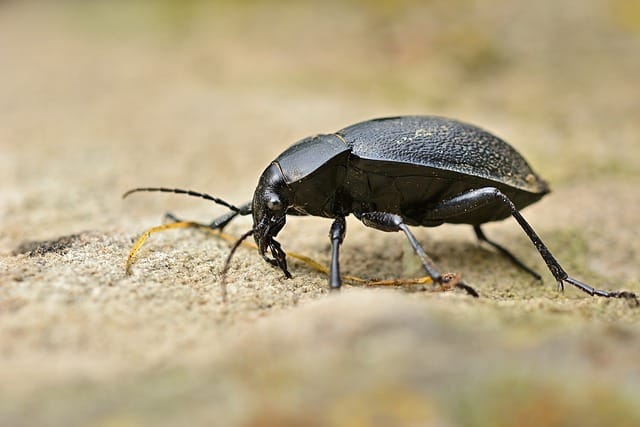Promoting pollinators: Ground beetles
Pollinators play a crucial role in ecological systems by facilitating the reproduction of plants

In this article:
- Introduction
- What are Ground Beetles?
- Anatomy and Characteristics of Ground Beetles
- Ground Beetles as Pollinators
- Role of Ground Beetles in Pollination
- Ground Beetles and Plant Relationships
- Types of Plants Pollinated by Ground Beetles
- Importance of Ground Beetles in Ecosystems
- The Pollination Process by Ground Beetles
- Challenges Faced by Ground Beetles as Pollinators
- Conservation Efforts for Ground Beetles and Pollination
- Future Research Directions and Implications
- Conclusion
Introduction
Pollinators play a crucial role in ecological systems by facilitating the reproduction of plants. While bees and butterflies are often highlighted as the primary pollinators, ground beetles also contribute significantly to the pollination process. This article aims to shed light on the importance of ground beetles as pollinators, their role in plant relationships, and the challenges they face in their pollination efforts.
What are Ground Beetles?
Ground beetles, also known as carabid beetles, belong to the family Carabidae, which is one of the largest groups in the insect order Coleoptera. They are typically found in various habitats, including forests, grasslands, and agricultural fields. Ground beetles are characterized by their elongated bodies, hardened forewings (elytra), and powerful mandibles.
Anatomy and Characteristics of Ground Beetles
Ground beetles possess several unique anatomical and behavioral characteristics that make them well-suited for their role as pollinators. Their large compound eyes allow for excellent vision, enabling them to efficiently navigate through their environment and locate flowers. Additionally, their strong mandibles aid in the extraction of nectar and pollen from flowering plants.
Ground Beetles as Pollinators
While ground beetles are primarily known for their role as predators, they have been increasingly recognized as important pollinators. As they forage for prey, ground beetles inadvertently transfer pollen from one flower to another, facilitating plant reproduction. This mutually beneficial relationship between ground beetles and flowering plants highlights the ecological significance of their pollination services.
Role of Ground Beetles in Pollination
Ground beetles contribute to the pollination process in several ways. They visit flowers in search of nectar and pollen, with their bodies coming into contact with reproductive parts of the flowers. This contact allows for pollen transfer between flowers, leading to fertilization and seed production. Furthermore, ground beetles' frequent movement across different flower species enhances genetic diversity within plant populations.
Ground Beetles and Plant Relationships
Ground beetles have intricate relationships with flowering plants, as they rely on these plants for nectar and pollen resources. Some ground beetle species have specific preferences for certain plants, while others are generalists, visiting a wide range of flowers. The diversity of ground beetle species and their interactions with different plant species contribute to the overall resilience and stability of plant communities.
Types of Plants Pollinated by Ground Beetles
Ground beetles are known to pollinate a variety of plant species, including both wildflowers and cultivated crops. Some examples of plants pollinated by ground beetles include sunflowers, goldenrods, evening primroses, and strawberries. The breadth of plant species they interact with highlights their critical role in maintaining biodiversity and supporting agricultural productivity.
Importance of Ground Beetles in Ecosystems
Ground beetles play a vital role in ecosystems beyond their pollination services. As generalist predators, they help regulate populations of herbivorous insects, protecting plants from excessive damage. Their presence also contributes to nutrient cycling and soil health, as their activity influences decomposition rates and the movement of organic matter.
The Pollination Process by Ground Beetles
The pollination process by ground beetles occurs through a sequence of events. When ground beetles visit flowers in search of nectar, they come into contact with the flower's anthers, which contain pollen. As they continue their search for food, the pollen adheres to their bodies. Subsequently, when they visit another flower of the same plant species or a different plant, some of the pollen is transferred to the stigma, facilitating fertilization and subsequent seed formation.
Challenges Faced by Ground Beetles as Pollinators
Despite their important role, ground beetles face several challenges as pollinators. Habitat loss and fragmentation due to agricultural expansion and urbanization limit their access to food resources and nesting sites. Pesticide use also poses a significant threat, as exposure to harmful chemicals can directly impact ground beetles and disrupt their pollination activities.
Conservation Efforts for Ground Beetles and Pollination
Conservation efforts aimed at promoting ground beetles as pollinators are essential to ensure their continued survival and ecological contributions. These efforts include preserving natural habitats, creating pollinator-friendly landscapes with diverse plant species, reducing pesticide usage, and implementing agricultural practices that support ground beetle populations.
Future Research Directions and Implications
Further research is needed to better understand the intricacies of ground beetles' pollination behavior and their specific interactions with different plant species. This knowledge can inform conservation strategies and help identify key plant species that rely heavily on ground beetles for pollination. Additionally, investigating the potential impact of climate change on ground beetle populations and their pollination services is crucial for long-term planning and management.
Conclusion
Ground beetles are an often-overlooked group of pollinators that play a significant role in plant reproduction and ecosystem functioning. Recognizing their importance, conserving their habitats, and promoting their pollination services are essential for maintaining biodiversity and ecological balance. By understanding the complexities of ground beetle plant relationships and addressing the challenges they face, we can ensure the continued health and resilience of our natural ecosystems.
